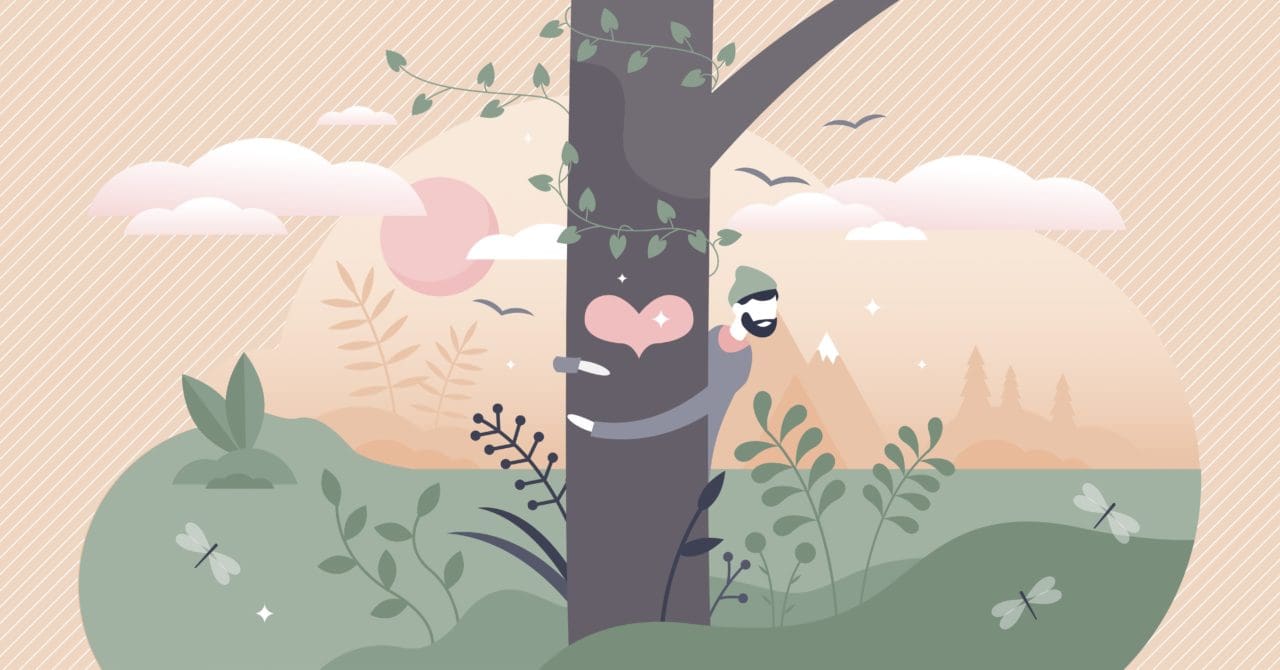Most psychedelic research studies focus on mental health conditions like PTSD, depression, or substance use disorders. Others investigate the mystical-type experience and spiritual dimensions of psychedelic healing rituals. But at the intersections of medical anthropology and psychedelic therapy lies an emerging field of study that some say is the future of psychedelic therapy.
If the claims about psychedelic medicine’s ability to enhance feelings of nature-relatedness are valid, combining psychedelics with the field of Nature Therapy can lead to profound healing modalities. But before we dive into research on psychedelics and nature-relatedness, let’s touch on Nature Therapy, often called Ecotherapy.
Psychedelic Healing is Natural
Nature Therapy has many ideations and frameworks, each one applicable to certain conditions more than others, but always grounded in the idea that every organism, whether Earth or human, seeks healing and homeostasis.
In the Ecotherapy model, therapists and practitioners approach the psyche from a different perspective. Ecopsychology is a branch of psychology that approaches the mind differently than Freud, the father of psychotherapy. The term “ecodelia” was coined by David Luke to describe this intersection of ecopsychology and psychedelics.
Instead of being a tangible part of the human brain, consciousness is understood to also be embedded in the world and environment. Animals are not objects but sentient beings that one has a relationship with. When we slow down and learn how to listen, we might find that the river “teaches” us something important, whether about ourselves, the people in our lives, or the struggles we are enduring.
Nature Immersion Has Natural Antidepressant Effects
Most people don’t realize it, but they practice Ecotherapy every day when they communicate with their pets in a relational way. Similarly, some people view plants as sentient and one can relate to a tree, mountain, river; or build a relationship with psychoactive plant medicine.
The wonderful thing about Nature Therapy is that nature is rather ubiquitous, and anyone can become familiar with its psychology and philosophy. As they do, they begin to feel more comfortable figuring out a personal process of reconnecting with the natural world. It’s fairly easy to feel empowered or supported by something as simple as a flower, cloud, or even the memory of a favorite tree.
Nature Relatedness
“Nature relatedness” is a personality domain that refers to the extent that a person identifies with the environment around them. Like the personality domains of openness, conscientiousness, agreeableness, extraversion, and neuroticism, nature-relatedness was long thought to be “fixed” in the adult personality.
Nature-relatedness is thought to lead to an increase in “pro-environmental behaviors” and influence attitudes toward sustainability and environmental concerns. Still, this term is a bit of a misnomer as the “pro” or positive behaviors are not defined by what is beneficial for the environment. Instead, pro-environmental behaviors are more related to what the person perceives to be beneficial.
In the long run, these behaviors might not be helpful unless embedded in networks working toward systematic changes. With its roots in activism and social justice, Ecopsychology can play a supporting role in this regard.
Psychedelics and Nature Relatedness
Several papers discuss the role of psychedelics and nature-relatedness. In 2017, Matthias Forstmann and Christina Sagioglou published a paper that established a correlation between past psychedelic use and pro-environmental behavior.
Some scholars suggest that ego-dissolution can explain the “self-nature overlap” that people experience when using psychedelics. Without the boundaries and structure of the ego, it is perhaps necessary to imprint one’s identity on what is available and nearby, and nature is always nearby.
In a 2018 pilot study, researchers saw limited but promising evidence that psilocybin could influence nature-relatedness. A 2019 online study confirmed the correlation between nature-relatedness and concurrent psychedelic use. Participants were tested on a nature-relatedness scale at two weeks, four weeks, and two years post-treatment. With a significant sample size (N=654), researchers found that nature relatedness was dependent upon the “extent of ego-dissolution and the perceived influence of natural surroundings during the acute psychedelic state.” This suggests that ego-dissolution in a naturalistic setting has additional therapeutic benefits compared to an office or a clinical setting.
A 2020 paper investigated the role that naturalistic or nature-based settings may have on the therapeutic outcomes of psychedelic therapy. Laying out an argument for the role that “nature contact” might play in the healing process. The authors offered evidence of neurological and psychological benefits that are unique to nature-relatedness and proposed psychedelic therapy for treating symptoms of nature disconnection.
The Future of Nature Relatedness Research
As the ecological crises of our time continue to evolve, progress, and spiral further out of control, many researchers have claimed that psychedelics and their potential to increase feelings of nature-relatedness have the potential to play an important part in our future.
With how desperate things feel and appear, it sounds nice to think that a psychedelic healthcare paradigm could have such an impact. But, as researchers note, psychedelics on their own, whether used in therapy or recreation or spiritual pursuits, are not likely to result in the kind of pro-environmental behaviors that can turn the tides on the environmental disasters already underway. The magnitude of our combined ecological crises will take community organizing, policy reform, corporate accountability, and the kind of resilience that psychedelics and Ecotherapy can help inspire and nurture.
There is already a wide field of Ecotherapy that includes wilderness coaches, psychedelic guides, and clinical therapists that integrate ecological healing modalities into their work. Forest bathing has demonstrated health benefits, and soil microbes are known to act as natural antidepressants. One might wonder – what would happen if someone grew their own plant medicines from seed or spore? Might that change the outcomes?
Permaculture educators and horticultural therapists consider cultivating and caring for medicinal plants as an essential part of the therapeutic process. The world of naturopathic medicine and herbalism all integrate beautifully with Ecotherapy and psychedelic treatment models. Though there is not yet a regulated industry or license for Ecotherapy practitioners, it seems that this field may serve as an ideal intersection between psychedelic chaplaincy and counseling.
In the meantime, Synthesis, a psychedelic therapy research center in England, is beginning to develop protocols using Ecotherapy models and is expected to be reporting on their progress in the coming year.









